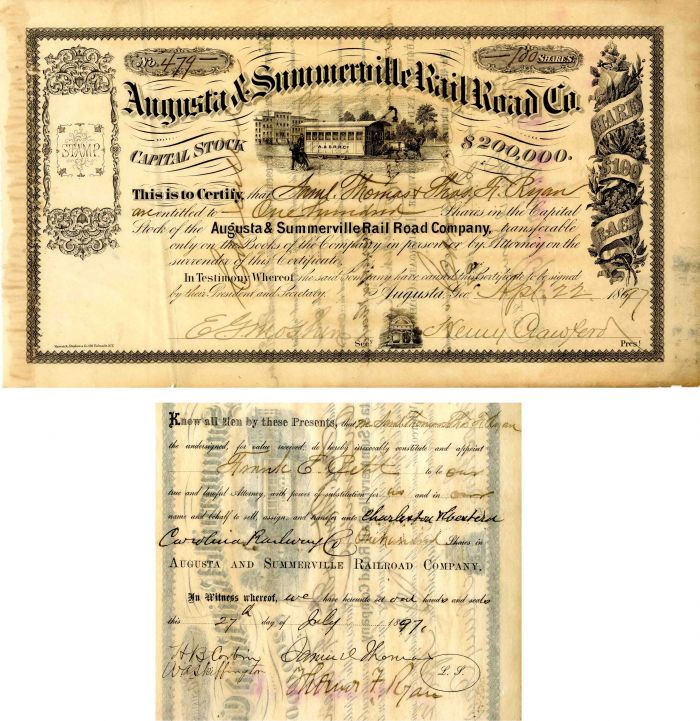Augusta and Summerville Rail Road Co. Issued to and Signed by Thos. F. Ryan- Stock Certificate
Inv# AG2349 Stock
Stock issued and signed on back by Thomas F. Ryan. Rare!

Thomas Fortune Ryan (1851-1928) was born near Lovingston, Virginia. Ryan’s father was a tailor and manager of a small hotel. His mother died when he was 5. His father remarried and moved to Tennessee two years later. Ryan was reared by his mother’s extended family in Lovingston, who were Protestants.
In 1868, seeking his fortune outside the post-Civil War South, 17-year-old Ryan moved to Baltimore to seek his fortune. En route to Maryland, Ryan converted to Catholicism after long discussions with a fellow passenger on the train. In Baltimore, John S. Barry, a prosperous dry goods merchant, hired him. By 1872, Barry helped Ryan secure a brokerage assistant position on Wall Street. Ryan opened a brokerage firm, Lee, Ryan & Warren, with two partners the following year. In 1873 he married Barry’s daughter, Ida Mary Barry, whose family were devout Catholics. With her he had three children.
In 1874, his firm purchased Ryan a seat on the New York Stock Exchange, making him the youngest member in Exchange history. At the same time, Ryan became active in politics, especially the Tammany Hall machine that controlled much of the city's operations, which gave him political and industrial contacts across the city.
Ryan's fortune began in public transit. In 1883, he founded the New York Cable Railroad and bid on the proposed route from lower Manhattan to Midtown. After numerous legal and financial problems, in 1886 Ryan re-organized his cable railroad as the Metropolitan Traction Company. Metropolitan continually acquired additional lines so that by 1900 Ryan controlled most of New York’s streetcar operations.
Ryan’s most profitable investment was tobacco. Having invested in tobacco stocks throughout the 1890s, Ryan joined his assets forming The Union Tobacco Company. Shortly thereafter, Ryan merged his company with that of his greatest competitor, James Duke of North Carolina, forming the American Tobacco Company. Together Ryan and Duke developed the British-American Tobacco Company to protect American tobacco trade in Europe.
In 1905 Ryan purchased the Equitable Life Assurance Society, a major company in the insurance industry with $400 million in assets. Although Ryan strove to make Equitable more responsive to its policy holders, public reaction to his purchase of the company was overwhelmingly negative. His reputation for cutthroat business dealings in the streetcar and subway businesses made the public distrustful and, in 1909, he sold his Equitable stock.
Also in 1905, Ryan's Metropolitan street car system was threatened by a major competitive development, New York’s increasingly popular subway system. He merged his company with August Belmont’s Interborough Rapid Transit Company. But the joint company’s finances were shaky, and Ryan pulled out. Meanwhile, some $35 million that Ryan had raised in a bond issue were misappropriated. Ryan was investigated for corruption in 1908, but the grand jury brought no charges.
Meanwhile, Ryan was making fortunes with coal mines, banks, public utilities and railroads. At one time Ryan had controlling interest in 30 corporations.
A stock certificate is issued by businesses, usually companies. A stock is part of the permanent finance of a business. Normally, they are never repaid, and the investor can recover his/her money only by selling to another investor. Most stocks, or also called shares, earn dividends, at the business's discretion, depending on how well it has traded. A stockholder or shareholder is a part-owner of the business that issued the stock certificates.









Ebay ID: labarre_galleries